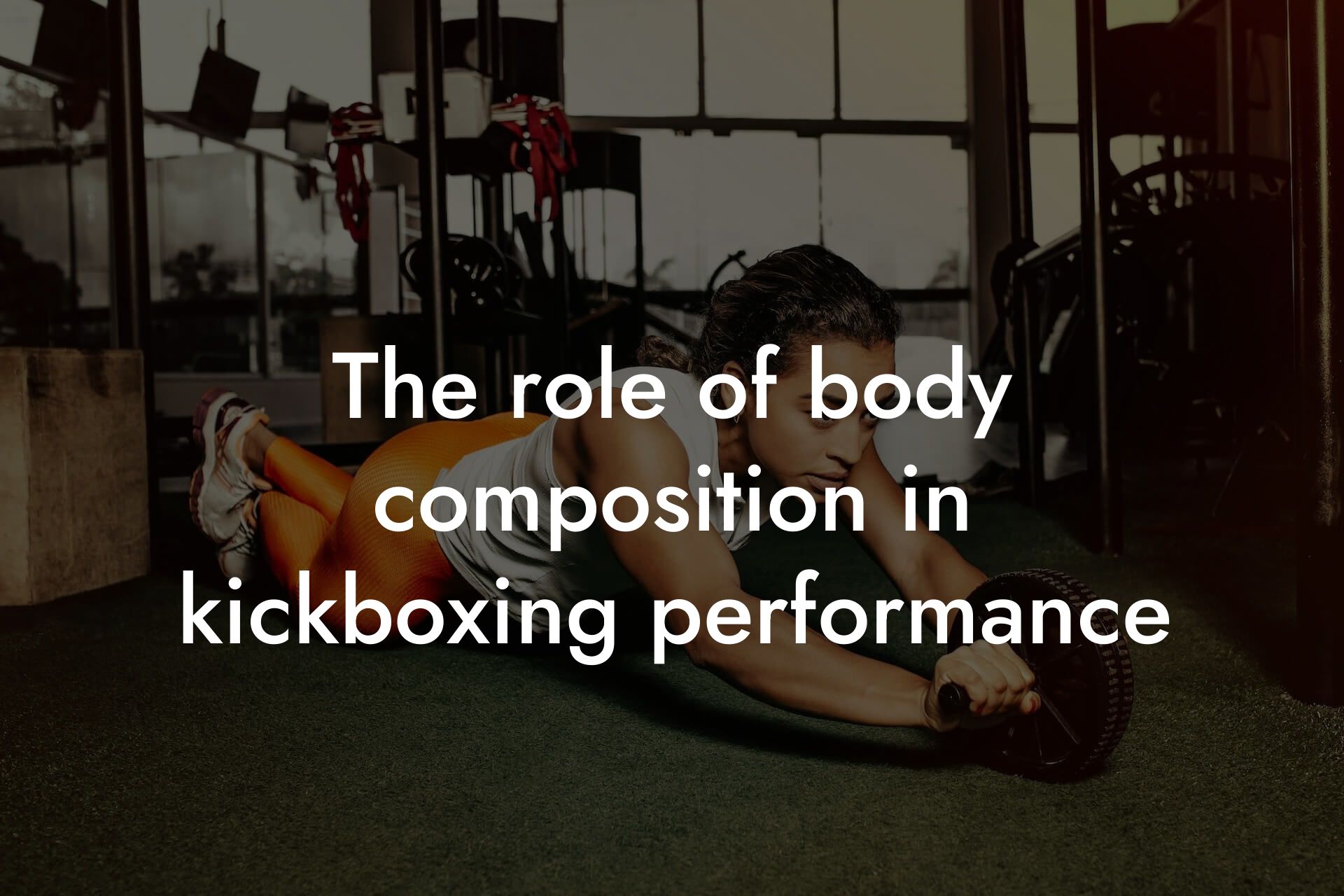Kickboxing is a high-intensity martial art that combines elements of boxing, martial arts, and aerobic exercise. It has become increasingly popular as a form of exercise, not only for its physical benefits but also for its mental and emotional advantages. One of the most significant benefits of kickboxing is its impact on cardiovascular health. In this article, we will explore the role of kickboxing in cardiovascular health, and how it can be an effective way to improve overall fitness and well-being.
Table of Contents
What is Cardiovascular Health?
Cardiovascular health refers to the health of the heart and blood vessels. It encompasses the ability of the heart to pump blood efficiently, the flexibility and elasticity of blood vessels, and the overall functioning of the circulatory system. Good cardiovascular health is essential for maintaining overall health, as it ensures that oxygen and nutrients are delivered to the body's tissues and organs, and waste products are removed efficiently.
How Does Kickboxing Improve Cardiovascular Health?
Kickboxing is an excellent way to improve cardiovascular health due to its high-intensity nature. During a kickboxing workout, the heart rate increases, and the body is challenged to pump blood more efficiently. This increased cardiovascular activity strengthens the heart, improves blood flow, and enhances the body's ability to transport oxygen and nutrients. Regular kickboxing practice can lead to:
- Improved cardiovascular endurance
- Increased heart rate variability
- Enhanced aerobic capacity
- Reduced blood pressure
- Improved circulation and oxygenation of the body's tissues
The Benefits of High-Intensity Interval Training (HIIT)
Kickboxing workouts often incorporate High-Intensity Interval Training (HIIT), which involves short bursts of high-intensity exercise followed by brief periods of rest. HIIT has been shown to be particularly effective for improving cardiovascular health, as it:
- Increases caloric burn and fat loss
- Improves insulin sensitivity and glucose metabolism
- Enhances mitochondrial function and biogenesis
- Increases human growth hormone production
- Improves mental clarity and focus
Cardiovascular Benefits for Specific Populations
Kickboxing can be beneficial for individuals with specific health conditions or populations. For example:
- Individuals with hypertension: Kickboxing can help lower blood pressure and improve cardiovascular health.
- Diabetics: Kickboxing can improve insulin sensitivity and glucose metabolism.
- Obese individuals: Kickboxing can aid in weight loss and improve overall cardiovascular health.
- Older adults: Kickboxing can help maintain or improve cardiovascular health, reducing the risk of age-related diseases.
Additional Benefits of Kickboxing
Beyond its cardiovascular benefits, kickboxing offers a range of additional advantages, including:
- Improved muscle strength and endurance
- Enhanced flexibility and coordination
- Better balance and agility
- Increased self-confidence and self-discipline
- Stress relief and improved mental well-being
Incorporating Kickboxing into Your Fitness Routine
If you're interested in incorporating kickboxing into your fitness routine, here are some tips to get you started:
- Find a qualified instructor or kickboxing gym
- Start with beginner classes and gradually increase intensity
- Warm up and cool down properly to prevent injury
- Listen to your body and take regular breaks
- Combine kickboxing with other forms of exercise for a well-rounded fitness routine
In conclusion, kickboxing is an excellent way to improve cardiovascular health, offering a range of benefits that extend beyond physical fitness. By incorporating kickboxing into your fitness routine, you can improve your overall health, increase your energy levels, and enhance your mental well-being. At Tano Performance Group, we understand the importance of maintaining a healthy and fit physique, which is why we offer comprehensive body assessments using our state-of-the-art DEXA machine. Take the first step towards achieving your fitness goals and schedule your assessment today.
Frequently Asked Questions
What is kickboxing and how does it relate to cardiovascular health?
Kickboxing is a high-intensity martial art that combines elements of boxing and kicking techniques. It is an excellent way to improve cardiovascular health by increasing heart rate, blood flow, and oxygenation of the body. Regular kickboxing practice can help strengthen the heart, lungs, and blood vessels, leading to improved overall cardiovascular fitness.
What are the cardiovascular benefits of kickboxing?
Kickboxing offers numerous cardiovascular benefits, including improved heart rate variability, increased aerobic capacity, enhanced blood flow, and reduced blood pressure. It also boosts cardiovascular endurance, allowing individuals to perform daily tasks with more energy and efficiency.
How does kickboxing improve heart health?
Kickboxing is an aerobic exercise that raises heart rate and blood pressure, strengthening the heart and improving its efficiency. Regular practice can help lower resting heart rate, increase cardiac output, and reduce the risk of heart disease.
Can kickboxing help with weight loss?
Yes, kickboxing is an effective way to burn calories and aid in weight loss. A typical kickboxing session can burn between 700-1000 calories, making it an excellent addition to a weight loss program. Additionally, kickboxing builds muscle mass, which further boosts metabolism and helps with weight management.
What is the ideal frequency and duration for kickboxing sessions?
For optimal cardiovascular benefits, it's recommended to practice kickboxing at least 2-3 times per week, with sessions lasting 45-60 minutes. However, beginners may want to start with shorter sessions (30-45 minutes) and gradually increase duration and frequency as they build endurance.
Do I need prior martial arts experience to start kickboxing?
No, prior martial arts experience is not necessary to start kickboxing. Many kickboxing classes and programs are designed for beginners, and instructors will guide you through proper techniques and movements.
What are the essential equipment and gear needed for kickboxing?
The essential equipment and gear needed for kickboxing include hand wraps, boxing gloves, a mouthguard, and comfortable, breathable clothing and shoes. Some kickboxing classes may also use punching bags, focus mitts, and other training aids.
How does kickboxing compare to other forms of cardio exercise?
Kickboxing offers a unique combination of aerobic exercise, strength training, and flexibility work, making it an excellent alternative to traditional cardio exercises like running or cycling. It also provides a fun and engaging way to improve cardiovascular fitness, reducing the risk of plateaus and boredom.
Can kickboxing help improve mental health and reduce stress?
Yes, kickboxing is an excellent way to reduce stress and anxiety while improving mental health. The physical activity and intense focus required for kickboxing can help clear the mind and reduce symptoms of depression and anxiety.
How does kickboxing impact bone density?
Kickboxing is a weight-bearing exercise that can help improve bone density, particularly in the hips, legs, and core. This is especially important for individuals at risk of osteoporosis or osteopenia.
Can kickboxing be modified for different fitness levels?
Yes, kickboxing can be modified to accommodate different fitness levels. Instructors can provide adjustments and modifications to suit individual needs, making it an accessible and inclusive form of exercise.
What are the safety considerations for kickboxing?
As with any high-intensity exercise, it's essential to take safety precautions when practicing kickboxing. This includes warming up properly, cooling down, and listening to your body to avoid injury. It's also crucial to work with a qualified instructor who can provide guidance and support.
How does kickboxing impact flexibility and mobility?
Kickboxing incorporates a range of movements that can help improve flexibility and mobility, particularly in the hips, legs, and core. Regular practice can increase range of motion, reduce stiffness, and enhance overall flexibility.
Can kickboxing be used as a form of cross-training for other sports?
Yes, kickboxing can be an excellent form of cross-training for other sports, such as martial arts, boxing, or even team sports like soccer or basketball. It can help improve cardiovascular endurance, agility, and overall athleticism.
How does kickboxing impact body composition?
Kickboxing can help improve body composition by building lean muscle mass, increasing metabolism, and burning calories. Regular practice can lead to a reduction in body fat percentage and an improvement in overall physique.
What are the benefits of kickboxing for high-earning professionals?
Kickboxing offers numerous benefits for high-earning professionals, including improved physical appearance, increased energy levels, and enhanced mental clarity. It can also provide a healthy outlet for stress and anxiety, helping to improve overall work-life balance.
How can I incorporate kickboxing into my busy schedule?
To incorporate kickboxing into your busy schedule, consider finding a studio or gym that offers flexible scheduling, early morning or lunchtime classes, or online training options. Even 2-3 sessions per week can make a significant impact on cardiovascular health and overall fitness.
What are the long-term benefits of regular kickboxing practice?
The long-term benefits of regular kickboxing practice include improved cardiovascular health, increased muscle mass, enhanced bone density, and a reduced risk of chronic diseases like heart disease and diabetes.
Can kickboxing be practiced at any age?
Yes, kickboxing can be practiced at any age, although it's essential to consider individual health and fitness levels. Many kickboxing classes and programs cater to seniors or individuals with specific health concerns, making it an accessible form of exercise for people of all ages.
How does kickboxing impact sleep quality?
Kickboxing can help improve sleep quality by reducing stress and anxiety, increasing physical activity, and promoting relaxation. Regular practice can lead to improved sleep duration, quality, and overall sleep hygiene.
What are the benefits of kickboxing for individuals with chronic health conditions?
Kickboxing can be an excellent form of exercise for individuals with chronic health conditions, such as heart disease, diabetes, or obesity. It can help improve cardiovascular health, increase mobility, and reduce symptoms of chronic conditions, under the guidance of a qualified instructor and healthcare professional.
How can I track my progress and measure the effectiveness of kickboxing?
To track your progress and measure the effectiveness of kickboxing, consider monitoring metrics such as heart rate, blood pressure, body fat percentage, and overall fitness level. You can also track your progress through regular assessments, goal setting, and adjustments to your training program.
Here are some related articles you might love...
- Balancing strength, speed, and technique in martial arts
- How DEXA scans can benefit kickboxing athletes
- The role of body composition in kickboxing performance
- Strength and conditioning programs for kickboxing
- Nutrition tips for martial arts practitioners
- Reducing body fat for improved speed and agility in martial arts
- Recovery strategies for kickboxers after sparring sessions
- Bone density and its role in injury prevention in martial arts
- Maintaining muscle mass and flexibility in martial arts
Zak Faulkner
Zak Faulkner is a leading authority in the realm of physical health and body composition analysis, with over 15 years of experience helping professionals optimise their fitness and well-being. As one the experts behind Tano Performance Group, Zak has dedicated his career to providing in-depth, science-backed insights that empower clients to elevate their physical performance and overall health.
With extensive knowledge of DEXA technology, Zak specializes in delivering comprehensive body assessments that offer precise data on body fat, muscle mass, bone density, and overall physique. His expertise enables individuals to make informed decisions and achieve their fitness goals with accuracy and confidence. Zak’s approach is rooted in a deep understanding of human physiology, combined with a passion for helping clients unlock their full potential through personalised strategies.
Over the years, Zak has earned a reputation for his commitment to excellence, precision, and client-focused service. His guidance is trusted by top professionals who demand the best when it comes to their health. Whether advising on fitness programs, nutritional strategies, or long-term wellness plans, Zak Faulkner’s insights are a valuable resource for anyone serious about taking their health and fitness to the next level.
At Tano Performance Group, Zak continues to lead our Content Team revolutionising how professionals approach their physical health, offering unparalleled expertise that drives real results.




